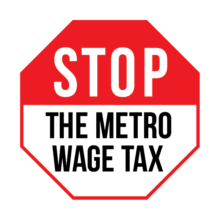Metro Is Sending Voters a Transportation Tax, Even as Tomorrow’s Commute Looks Foggy
By Rachel Monahan
This month, regional government Metro referred to the November ballot the largest tax measure in Portland history: $5 billion for transportation, including a light rail line to Tualatin. Metro is plowing forward in the middle of a pandemic, against the outcry of business owners, because it says the need is urgent.
“The time to act is now,” Metro Council President Lynn Peterson told WW before the referral of the measure. “If we delay, we will not be able to create tens of thousands of jobs when we need them most, and our region could miss opportunities to leverage federal, private and philanthropic funds.”
But Metro is taking a big gamble at a moment of rapid change. That unpredictability extends to transportation. The fallout from COVID-19, social distancing and the economic downturn are changing American traffic patterns and may result in other, more drastic changes in how people commute.
Already, some in the car industry predict a decrease in driving. Will that chilling effect extend to MAX?
WW spoke to a half-dozen longtime observers of transportation patterns. Some say there’s no way to predict what the pandemic will mean for roads and rail.
